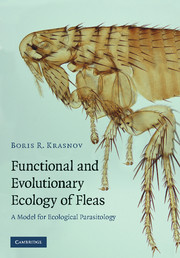Preface
Published online by Cambridge University Press: 14 August 2009
Summary
I was privileged to be introduced to the study of zoology in the Department of Zoology and Comparative Anatomy of Terrestrial Vertebrates at the Moscow State University in Russia. I began my scientific career studying behavioural mechanisms that influence the spatial structure of rodent populations in different landscapes, from the tundra and the Arctic shore of the Chukchi Peninsula to the rainforests of southern Vietnam. At the time, academic staff members and students of the department under the leadership of Professor Nikolai Naumov were working intensively on rodent ecology, aiming to understand their role in infectious zoonoses, mainly the plague. Consequently, every student who studied rodent ecology was introduced to fleas, as they are the principal vectors of the plague.
In the beginning of the 1990s, I started to work at Ben-Gurion University of the Negev and continued to study rodents and other desert-dwelling animals (tenebrionid beetles and lizards) in the Negev Desert. These studies resulted in a book, Spatial Ecology of Desert Rodent Communities, written together with my colleagues Georgy Shenbrot and Konstantin Rogovin, and published by Springer-Verlag in 1999 (Shenbrot et al., 1999a). However, I also subliminally continued to collect fleas from every captured rodent, not being sure at that time why exactly I was doing this. In the mid 1990s, I read several papers by Robert Poulin, Serge Morand and Jean-François Guégan, which opened my eyes to an enthralling new world of parasites.
Information
- Type
- Chapter
- Information
- Functional and Evolutionary Ecology of FleasA Model for Ecological Parasitology, pp. ix - xivPublisher: Cambridge University PressPrint publication year: 2008
